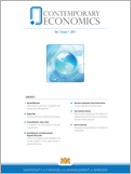Complementarities of Knowledge Worker Productivity: Insights from an Online Experiment of Software Programmers with Innovative Cognitive Style
Complementarities of Knowledge Worker Productivity: Insights from an Online Experiment of Software Programmers with Innovative Cognitive Style
Author(s): Natallia Pashkevich, Darek M. HaftorSubject(s): Business Economy / Management, Accounting - Business Administration, Human Resources in Economy, ICT Information and Communications Technologies
Published by: Akademia Ekonomiczno-Humanistyczna w Warszawie
Keywords: complementarity theory; individual productivity; knowledge worker; online experiment; software programmer;
Summary/Abstract: The literature has been inconclusive regarding which factors determine knowledge worker productivity. To remedy that gap, this paper presented an online experiment to measure the productivity of software programmers, as a representative of knowledge workers, in a particular situation when a more aligned with the work process IT system is used. The assumed research model was based on the systems approach of complementarity theory and combined the following factors: worker’s cognitive style, work process, decision-making authority, worker training mode, and worker incentive. The experiment was conducted for 4 months and attracted 110 participants with innovative cognitive style from two crowd-sourcing platforms. The results demonstrate that complementarities condition the productivity of a knowledge worker. More specifically, the learning effect is crucial for productivity gains and should be considered in further detail in the design of new studies. The paper’s key contribution is the test of a unique configuration of two systems of complementary factors, because most of the literature has investigated only the impact of particular factors in isolation.
Journal: Contemporary Economics
- Issue Year: 14/2020
- Issue No: 2
- Page Range: 236-253
- Page Count: 18
- Language: English

